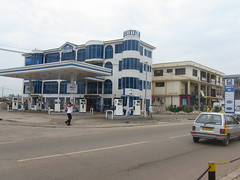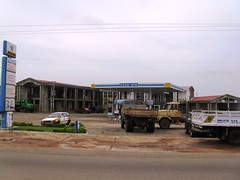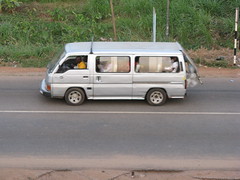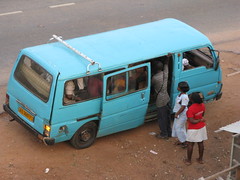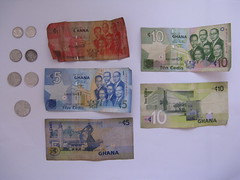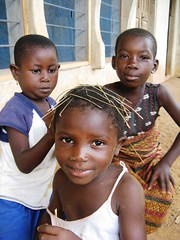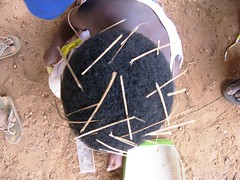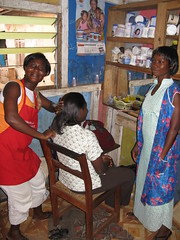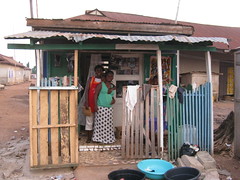Thursday, May 21, 2009
Filling Stations, Tro-Tros, Chinese in Ghana
This is a filling station, not far from the Cultural Centre in Kumasi. It's an example of many that are popping up. They are very large, containing many stores like a mini-mall. Their glass structures stand out amongst the many concrete buildings. Oil was recently discovered off the coast of Ghana, maybe a year and a half ago it was announced in the news. The government quickly said that they will use the resouces to the benefit of all. This probably due to the troubles in the Nigeria Delta where the riches from oil production are not benefitting most of the people in the region.
This is where I'm typing right now. It's about 30 minutes from the village I live in, Adugyama. Kwame, a friend of Doris's first took me here, and it's the fastest internet cafe I have found in the area. The ones in Kumasi were much slower than here. Kwame and Doris both know the owner of this filling station and I had lunch with him one day. He lived in Germany for many years. He said the new addition (left in the photo) will be a Chinese language school. His wife does international trading and goes to China often.
The Chinese are very active in Ghana. They are doing joint partnerships with Ghana on road construction. On the road I travel on to Kumasi, I see advisors working on its expansion. I also have seen Chinese/advisors on the expansion of the highway north of Accra. There is a book that was making the news here in March called Dead Aid by Dambisa Moyo. She has degrees from Oxford and Harvard. She argues that aid has actually been detrimental to Africa and the business/partnership approach such as what China is doing is a better approach.
At Star Oil, there is also a grocery market, an MTN phone office, and a restuarant. I usually eat Jolof rice(fried rice), chicken, and a salad along with a Star beer.
This is a tro-tro. It is the primary way I get around and it's inexpensive. Kwame explained to me that the lowest pesewa is called a tro-tro, basically a penny. And it usually costs pennys to get from place to place, thus the name. The vans I see mostly are Nissan vans. They can get fourteen passengers in, not counting the driver, the "mate" (coin collector), or children.
The "mate" operates the van door, will chant the names of the destinations alerting people on the sides of the road. He often sounds like an auctioneer and it took me awhile to get used to the chanting. Abuakwaabaukwaabuakwa was what I would listen for. Or when I was staying in Kumasi studying batik at the Culture Center, I would listen for Santasisantasisantasi. This was where I went to for the night, my teachers residence.
Hand signals are also used. In Accra, I often would go to Nkrumah Circle, also called Accra Circle, or just Circle. The hand jesture I would look for from the tro-tro would by an index finger pointing down and making a circle. The chant would often be Circcirccirccirc.
When I was staying at Lincoln School and needed to get to Kumasi, the tro-tros would be going to Kejetia Market. The hand signal used would be an index finger pointing upwards and jabbing upwards.
If a tro-tro is not full, the driver would beep his horn and he or his mate will make a hand gesture with the hand open and upward going in a twisting manner, saying which way you heading? I often mouth the name of the city and they would stop. If it's the next place coming up, I will often make a gesture pointing downward and that's sufficient.
I've had to wait a long time for a tro-tro and sometimes it gets competetive getting into one. In some cases, I'll opt for a taxi. A shared taxi is cheaper and fills with usually four other people. A drop taxi is one you take by yourself and I've hardly taken that one. Oftentimes I might wait inside of a parked tro-tro until it gets filled up. I've only had to wait 20 minutes or so, but I've heard it can be hours in some remoter places.
I like the tro-tros. It's not the safest way to get around, but when you're packed in with so many other people, there can be a community experience, an intimacy. Some of my favorite moments in Ghana have been looking out the windows of a tro-tro at the beautiful, lush countryside--trees, plantains, fields of green, maize, and rocky hills. When there's some nice African music, it doesn't get any better. Oftentimes, there's talk radio in Twi. It sounds similar to talk radio in the States, often very loud and constant.
Friday, April 17th: From Adugyama to Kumasi. This morning there were 4 goats stuffed into the back end. I was near the back and one of the passengers was complaining about the goats nipping them or hoofing them in the heels. The owner who looked like he came from the north because he had on a moslem like scarf gently moved to the back so that a woman complaining could be further from the goats.
Between Accra and Kumasi, I've taken the government buses called STC and also the O&A buses. They're similar to Greyhound. A 5-6 hour trip between Kumasi and Accra costs 10 cedis on STC buses and 9 cedis on O&A buses. They show movies during the trip, usually Nigerian movies because they're in English and are entertaining. I watched one that was about a father an son, called Ibu and his son. The father is a mechanic and his son is usually getting into all sorts of trouble. They make for a comical pair. I watched a horror movie based on African witchcraft about a young woman defying her father and going to a party. A demon comes and haunts them and kills them off one by one. There was another movie where a woman is tired of the way men can marry more than one woman. She ends up courting three men and gets three marriage proposals from them. In the end, they find out what she's up to and play a trick on her.
Thursday, May 14, 2009
Ghana Money, Perspectives on Ghana, Cell Phones, Misc.
The cedi is the main currency of Ghana. I've been mainly using the one, five, and ten cedi notes. One dollar is equivalent to about 1.35 cedis. Only about a year ago, I believe, the cedi and the dollar were fairly equivalent. In the past few months, there has been inflation which has many people concerned.
The pesewas are the coins used. The ones in the picture from top to bottom are 5, 10, 20, and 50 pesewas. There are signs around Kumasi encouraging people to use coins. The coins were not too long ago meaningless until the new cedi notes were introduced.
The notes used to be in the thousands before the new system was introduced. One cedi was equivalent to 10,000 cedis before the change. 10 pesewas was 1,000 cedis. People often prefer will use the older system when asked about prices.
Perspectives on Ghana and Africa in General:
People often have certain ideas of Africa that are often overly simplistic from what the west is given in the media. I've talked to Ghanaians who tell me that the west only reports about the negative aspects of Africa and lump the whole continent together as if it was one country. When people asked me why I was going to Ghana, one of the reasons I gave was because my own ignorance was intolerable. I didn't want to just believe what I read in the papers. I wanted my own experience.
Ghanaians who travel overseas hear all sorts of crazy stories from Europeans and Americans who believe that they still live in trees or are all in little thatched roofed houses. They can't believe that Ghanaians would even want to return to their own country. This is what I've heard several times from Ghanaians.
Although there are certainly major problems in Ghana, it is considered one of the model countries on the continent for its stability, democracy, and economic growth. I have read that Uganda and Botswana are the other two model countries. Many people here in Ghana are thriving in business, building big houses, driving BMWs, Mercedes, Toyota SUVs, and all sorts of models associated in the west with wealth and financial status. Some Ghanaians I have talked to wish the west were more aware of these aspects as well.
Unfortunately, I am not that interested in taking photos and writing about nice cars, successful businesses, big houses, and other affluences and modern developments. I'm staying in a little village where they don't have as much financially. They are mainly a tight knit farming community who have some modern conveniences but also live traditionally.
I'm interested in witnessing how traditions combine, coexist, or get deferred to what is considered modern. I'll be mainly writing about these things and the people that I live with and meet.
That being said, I'll probably devote a couple blogs to modern developments and the increased affluence that is happening here in Ghana. Cell phones are everywhere now. Many people have maybe two cell phones, each from a different company. Those that don't have a phone, can go to a little kiosk, often a wooden box with an umbrella and pay to use the attendants phone. Kiosks and phone shops are everywhere The main phone companies are: MTN, Zain, Tigo, Kasapa, and Vodaphone.
Vodaphone, the recent merger of Ghana One Touch and Ghana Telecom, has done a big media blitz. Their color is red. Many buildings around Kumasi have been recently painted in a gloss red with the white Vodaphone symbol. Zain has T.V. commercials showing young people dancing and singing. One of their pitches is: Zain, your world of freedom...
My favorite T.V. commercial if from the cell phone company, Kasapa. It shows an older couple in their living room. It's late at night. The man is wearing a muscle shirt sitting on the couch watching T.V. The woman is in her night gown and wearing curlers. She is heavy set.
Her cell phone rings, she answers and begins a lively conversation. While talking, she walks back and forth blocking the T.V. Her husband gets irriated that she's blocking his view. Finally, she sits down and says goodbye to the caller. Her husband, exasperated, says something like, "Who was that? You were talking for two hours." She says, "Ahhhh, it was the wrong number."
Kasapa was advertizing reduced rates in the evening and night time. I bought one of the cheapest phones I could get for 30 cedis. The company I'm using is Tigo. I buy little cards of time that I punch into my phone.
Wednesday, May 6, 2009
Hair Stylists: Sandra and Her Mother, Rose
This is Sandra doing a really cool hair style for her friend using little sticks placed in her friend's hair. Sandra is five yrs. old. She spent a lot of time and was very focused on creating this really interesting hair fashion. I'd like to see this catch on and be seen on the streets of New York. An expansion of the two chopsticks style.
Sandra lives at the same place I do and is often drawing with me or hanging out and playing. She has many friends in the neighborhood. I see them playing hand games and 'kitchen' with tin cans and dirt and water. Her and her friends have all sorts of games they devise. They're often dancing and singing songs as well. Sandra's mother, Rose, runs a successful hair salon in town right on the Sunyani Rd.
Here is a top view of the hair style by Sandra.
This is Rose, Sandra's mother. She is Auntie Bea's sister and lives in the place that I'm at where there are two houses right next to each other. Here she is having fun posing for a photo in her hair salon.
She's usually very busy in her salon coloring hair, adding extensions and wigs, and doing various types of hair cuts. She has a couple of assistants as well who are learning from her.
Rose taught me how to hand wash my clothes properly and will occasionally cook me local Ghanaian dishes. I also have difficulties with my back on occasion and she teaches me different exercises and stretches.
Here is the view of her hair salon on the Sunyani Rd., the main highway between the cities of Kumasi and Sunyani.
A fashion note or cultural note: I noticed girls wearing two or three rows of beads around their waist, a belt of beads. I was told girls wear these beads because it will help them have wider hips and a larger bottom. Girls wear them up to ten yrs. of age or even older.
Another fashion note: I watched on the news that in Burkino Faso, the country north of Ghana the latest fashion trend is to create very dark, pronounced eyebrows using eyeliner. They showed all sorts of very long and interesting shaped dark lines on the eyebrows of women in Burkino Faso.
Subscribe to:
Posts (Atom)
